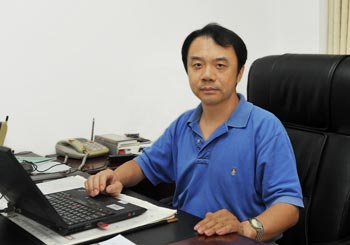WANG Yifang appointed as the Director of the Institute of High Energy Physics

|
Dr. WANG Yifang is appointed as the Director of the Institute of High Energy Physics (IHEP), the Chinese Academy of Sciences, as announced on the day of October 24, 2011 at a meeting held at IHEP.
WANG replaces Dr. CHEN Hesheng, who has served as the Director of IHEP since 1998. "We are delighted to have Dr. WANG Yifang - a high-calibre scientist and an excellent leader - as the new Director of IHEP," said Dr. CHEN Hesheng, "His scientific leadership and international vision will shape the Institute's future. This is a great choice for IHEP, and for the high energy physics community in China."
Dr. WANG Yifang, born in 1963 at Jiangsu Province, obtained his B.Sc degree from Nanjing University in 1984, Ph.D degree from the University of Florence in 1991. He worked subsequently in MIT as a research staff and in Stanford University as a research associate. He became a full research fellow at the Institute of High Energy Physics, Beijing, China in 2001.
Dr. WANG leads the BESIII experiment at the Beijing e+e- collider from the detector design and construction to the physics program. He assembled the BESIII international collaboration and is the spokesperson since beginning. In 2003, he proposed the Daya Bay Reactor Neutrino Experiment with a detailed detector design and an experimental plan, to precisely measure the mixing angle theta_13(θ13 ). He organized a sizable international team and was elected as the co-spokesperson. Under his leadership, the Daya Bay experiment successfully completed the detector design and construction, and will start full data taking next year.
Dr. WANG is an author of more than 300 scientific papers on neutrino physics, e+e-collision physics, cosmic-ray and astrophysics, detectors and data analysis methods covering his marvelous jobs with L3, AMS, Palo Verde, KamLAND and BES over the past 25 years.
The Institute of High Energy Physics (IHEP) is the biggest research center in China on basic science. The major research fields include particle physics, astrophysics, accelerator physics and technologies, synchrotron and nuclear radiation applications. IHEP has extensive cooperation with most of the high energy physics laboratories and participates in many experiments around the world. IHEP is staffed with more than 1200 employees plus 400 graduate students and post-doctors.
"Committing to excellence and international partnership, I look forward to working together with all the IHEP staff to efficiently operate a comprehensive institute, advance the frontiers of science and serve the needs of science and those of the nation." said Dr. WANG.
